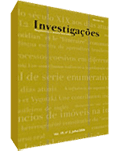Anúncios de imóveis na imprensa do Recife: do século XIX aos dias atuais
Abstract
Esta pesquisa tem por objetivo analisar os anúncios de comercialização de imóveis da atualidade na imprensa do Recife (publicados no Jornal do Commercio) e cotejá-los com os do século XIX (extraídos do Diario de Pernambuco). Analisamos a estrutura textual e os aspectos discursivos do corpus, procurando também levantar o léxico usado nestes anúncios de imóveis, o que nos permitiu identificar importantes aspectos ideológicos e sócio-culturais relevantes de dois períodos distintos na vida da sociedade recifense: o atual e o do século XIX.References
BAKHTIN, M. 1992. Gêneros do discurso. In: —. Estética da criação
verbal. Trad. de M.E.G.G. Pereira. São Paulo: Martins Fontes.
BIDERMAN, M.T.C. 1979. Teoria lingüística; lingüística quantitativa e computacional. Rio de Janeiro: Ao Livro Técnico.
BRANDÃO, H.N. Discurso e tradição em anúncios da imprensa brasileira: da informação à sedução — imagens do cotidiano. USP. s/d
CARRASCOZA, J.A. 1999. A evolução do texto publicitário: a associação de palavras como elemento de sedução na publicidade. São
Paulo: Futura.
CARVALHO, N. 2000. Publicidade: linguagem da sedução. São Paulo:
Ática.
FREYRE, G. 1963. O Escravo nos anúncios de jornais brasileiros do séc. XIX. Recife: Imprensa Universitária.
______. 1979. Oh de Casa! Em torno da casa brasileira e de sua projeção sobre um tipo nacional do homem. Recife: Instituto Joaquim
Nabuco de Pesquisas Sociais.
______. 1968. Sobrados e Mucambos. 4ª ed. Rio de Janeiro: José
Olympio.
KOCH, I.V. & FÁVERO, L. 1988. Lingüística textual: introdução. São
Paulo: Cortez.
MARTINS, Jorge S. 1997. Redação Publicitária: teoria e prática. São
Paulo: Atlas.
MCLUHAN, M. 1962. The Gutemberg galaxy. Toronto: The University Press.
PESSOA, M. 2003. O gênero notícia no Brasil: notas para uma história. Recife: Ed. da UFPE.
SCHWARCZ, L.M. 1987. Retrato em branco e negro: jornais, escravos e cidadãos em São Paulo no final do século XIX. São Paulo: Companhia das Letras.
SCHWARCZ, L. M. 1987. Retrato em branco e negro: jornais, escravos e cidadãos em São Paulo no final do século XIX. São Paulo: Companhia das Letras.
VESTERGAARD, T. & SCHRODER, K.C. 2000. A linguagem da propaganda. São Paulo: Martins Fontes.
VESTERGAARD / SCHR∅DER. 2000. A linguagem da propaganda. São Paulo: Martins Fontes.
VILANOVA, J. B. 2001. Aspectos estilísticos da língua portuguesa.
Condensada e simplificada. 2. ed. Recife.
VILANOVA, J.B. 2001. Aspectos estilísticos da língua portuguesa.
Condensada e simplificada. 2. ed. Recife: Casa da Medalha.
Downloads
Published
How to Cite
Issue
Section
License
Copyright (c) 2006 Nelly Medeiros de Carvalho, Ana Carlota Rilho Machado, Ana Karine Pereira de Holanda Bastos

This work is licensed under a Creative Commons Attribution 4.0 International License.
Authors who publish with Revista Investigações agree to the following terms:
Authors retain copyright and grant the journal right of first publication with the work simultaneously licensed under the Creative Commons Attribution 4.0 International (CC BY 4.0) license that allows others to share the work with an acknowledgement of the work's authorship and initial publication in this journal.
Authors are able to enter into separate, additional contractual arrangements for the non-exclusive distribution of the journal's published version of the work (e.g., post it to an institutional repository or publish it in a book), with an acknowledgement of its initial publication in this journal.
You are free to:
Share — copy and redistribute the material in any medium or format for any purpose, even commercially.
Adapt — remix, transform, and build upon the material for any purpose, even commercially.
The licensor cannot revoke these freedoms as long as you follow the license terms.
Under the following terms:
Attribution — You must give appropriate credit , provide a link to the license, and indicate if changes were made . You may do so in any reasonable manner, but not in any way that suggests the licensor endorses you or your use.
No additional restrictions — You may not apply legal terms or technological measures that legally restrict others from doing anything the license permits.

